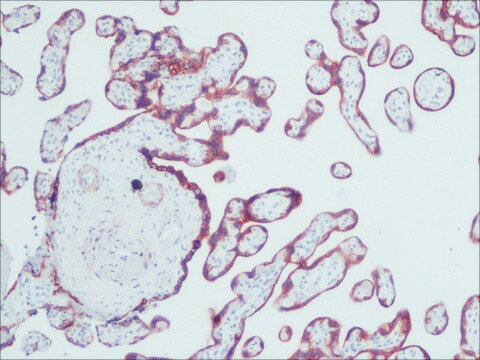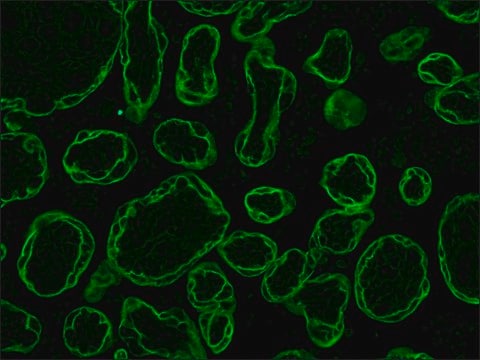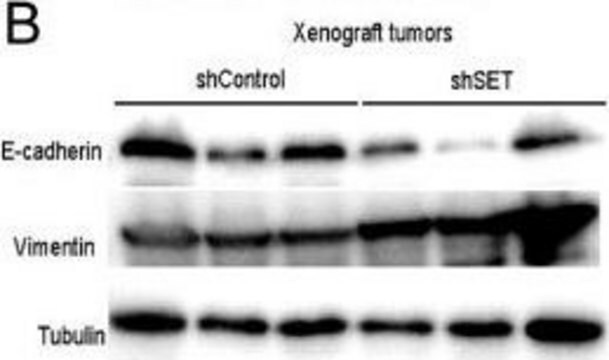C1801
Monoclonal Anti-Cytokeratin, pan antibody produced in mouse
clone PCK-26, ascites fluid
Sinonimo/i:
Monoclonal Anti-pan-Cytokeratin
About This Item
Prodotti consigliati
Origine biologica
mouse
Livello qualitativo
Coniugato
unconjugated
Forma dell’anticorpo
ascites fluid
Tipo di anticorpo
primary antibodies
Clone
PCK-26, monoclonal
contiene
15 mM sodium azide
Reattività contro le specie
human, chicken, snake, hamster, pig, goat, feline, bovine, carp, rat, rabbit, canine, lizard, sheep, mouse, guinea pig
tecniche
immunohistochemistry (formalin-fixed, paraffin-embedded sections): 1:300
immunohistochemistry (frozen sections): suitable
indirect immunofluorescence: 1:300 using protease-idgested, formalin-fixed, paraffin-embedded sections of human or animal tissues
western blot: suitable
Isotipo
IgG1
Condizioni di spedizione
dry ice
Temperatura di conservazione
−20°C
modifica post-traduzionali bersaglio
unmodified
Informazioni sul gene
bovine ... Krt1(100301161)
dog ... Krt1(444857)
human ... KRT1(3848) , KRT1(3848) , KRT1(3848) , KRT5(3852) , KRT5(3852) , KRT5(3852) , KRT6A(3868) , KRT6A(3868) , KRT6A(3868) , KRT6B(3854) , KRT6B(3854) , KRT6B(3854) , KRT8(3856) , KRT8(3856) , KRT8(3856)
mouse ... KRT1(16678) , KRT1(16678) , KRT1(16678) , Krt1(16678) , Krt5(110308) , Krt5(110308) , Krt5(110308) , Krt6a(16687) , Krt6a(16687) , Krt6a(16687) , Krt6b(16688) , Krt6b(16688) , Krt6b(16688) , Krt8(16691) , Krt8(16691) , Krt8(16691)
rat ... Krt1(300250) , Krt2-5(369017) , Krt2-5(369017) , Krt2-5(369017) , Krt2-8(25626) , Krt2-8(25626) , Krt2-8(25626)
Cerchi prodotti simili? Visita Guida al confronto tra prodotti
Descrizione generale
Specificità
Immunogeno
Applicazioni
Monoclonal Anti-Cytokeratin, pan may be used for the localization of cytokeratins using various immunochemical assays such as immunoblotting, dot blotting, and immunohistochemstry (immunofluorescence and immunoenzymatic staining).
A minimum antibody titer of 1:300 was determined by indirect immunofluorescent staining of protease digested, formalin-fixed, paraffin-embedded sections of human or animal tissues.
Azioni biochim/fisiol
Esclusione di responsabilità
Not finding the right product?
Try our Motore di ricerca dei prodotti.
Prodotti correlati
Raccomandato
Codice della classe di stoccaggio
10 - Combustible liquids
Classe di pericolosità dell'acqua (WGK)
WGK 3
Punto d’infiammabilità (°F)
Not applicable
Punto d’infiammabilità (°C)
Not applicable
Certificati d'analisi (COA)
Cerca il Certificati d'analisi (COA) digitando il numero di lotto/batch corrispondente. I numeri di lotto o di batch sono stampati sull'etichetta dei prodotti dopo la parola ‘Lotto’ o ‘Batch’.
Possiedi già questo prodotto?
I documenti relativi ai prodotti acquistati recentemente sono disponibili nell’Archivio dei documenti.
I clienti hanno visto anche
Il team dei nostri ricercatori vanta grande esperienza in tutte le aree della ricerca quali Life Science, scienza dei materiali, sintesi chimica, cromatografia, discipline analitiche, ecc..
Contatta l'Assistenza Tecnica.









